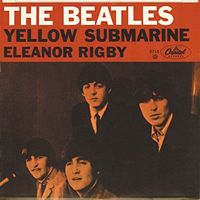Yellow Submarine
From Beatles Wiki - Interviews, Music, Beatles Quotes
| “Yellow Submarine” | |||||
|---|---|---|---|---|---|
 |
|||||
| Single by The Beatles from the album Revolver |
|||||
| B-side | "Eleanor Rigby" | ||||
| Released | 5 August 1966(UK) 8 August 1966(US) |
||||
| Format | 7" | ||||
| Recorded | Abbey Road Studios: 28-29 April; 6 June 1966 |
||||
| Genre | Pop | ||||
| Length | 2:38 | ||||
| Label | Parlophone (UK) Capitol (US) |
||||
| Writer(s) | Lennon/McCartney | ||||
| Producer | George Martin | ||||
| The Beatles singles chronology | |||||
|
|||||
| “ | The Yellow Submarine people, who were gross animals, apart from the guy who drew the painting, the actual yellow submarine, came and, apart from sort of lifting all the ideas for the movie out of our heads and not giving us any credit - like Eric Segal writing Lennonesque lines straight from In His Own Write style and the crew ... We had nothing to do with that movie and we sort of resented them and we didn't know what it was. It was the third movie that we owed these United Artists and Brian had set it up and we had nothing to do with it and we knew nothing about it. But I like the movie. I like Heinz [Edelmann]'s artwork. But they got all the ideas for the glove in the sky and the thing that sucks people up was my idea. They said, have you got any monsters? I said, yeah, there's Horace the vacuum cleaner in the swimming pool which was a thing you could buy, and it went 'round the pool sucking up the things, you know. And I said that could be a monster that sucks . . . And all things like that, they just took them and never credited. They wanted another song; I knocked off "Hey Bulldog." It's a good-sounding record that means nothing. | „ |
|
—John Lennon, 1980 |
||
| “ | It's a happy place, that's all. You know, it was just... We were trying to write a children's song. That was the basic idea. And there's nothing more to be read into it than there is in the lyrics of any children's song. | „ |
|
—Paul McCartney, 1966 |
||
| “ | Paul wrote the catchy chorus. I helped with the blunderbuss bit. | „ |
|
—John Lennon, 1972 |
||
| “ | 'Yellow Submarine' is Paul's baby. Donovan helped with the lyrics. I helped with the lyrics too. We virtually made the track come alive in the studio, but based on Paul's inspiration. Paul's idea. Paul's title... written for Ringo. | „ |
|
—John Lennon, 1980 |
||
| “ | I wrote that in bed one night. As a kid's story. And then we thought it would be good for Ringo to do. | „ |
|
—Paul McCartney, 1984 |
||
| “ | I was laying in bed in the Asher's garret, and there's a nice twilight zone just as you're drifting into sleep and as you wake from it-- I always find it quite a comfortable zone. I remember thinking that a children's song would be quite a good idea... I was thinking of it as a song for Ringo, which it eventually turned out to be, so I wrote it as not too rangey in the vocal. I just made up a little tune in my head, then started making a story-- sort of an ancient mariner, telling the young kids where he'd lived. It was pretty much my song as I recall... I think John helped out. The lyrics got more and more obscure as it goes on, but the chorus, melody and verses are mine. | „ |
|
—Paul McCartney, 1994 |
||
| “ | Paul came up with the concept of 'Yellow Submarine.' All I know is just that every time we'd all get around the piano with guitars and start listening to it and arranging it into a record, we'd all fool about. As I said, John's doing the voice that sounds like someone talking down a tube or ship's funnel as they do in the merchant marine. (laughs) And on the final track there's actually that very small party happening! As I seem to remember, there's a few screams and what sounds like small crowd noises in the background. | „ |
|
—George Harrison, 1999 |
||
| “ | There were albums which weren't any good as far as I was concerned, like 'Yellow Submarine.' We put all the songs together into an album form — I'm talking about English albums now, because in the states we found later that for every two albums we had, they (Capitol) would make three — because we put fourteen tracks on an album, and we'd also have singles that weren't included on albums in those days. They'd put the singles on, take off a bunch of tracks, change all the running order, and then they'd make new packages like 'Yesterday And Today,' just awful packages. | „ |
|
—George Harrison, Crawdaddy Magazine interview, 1977 |
||